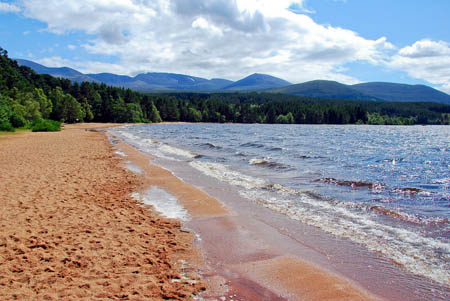Scotland’s biggest national park will not introduce bylaws to tackle problems caused by wild camping.
The Cairngorms National Park Authority decided there was no need to follow the lead of Scotland’s other national park authority and ban wild camping at trouble spots. The Cairngorms authority backed campers pitching their tents in the national park.
The right to wild camp is enshrined in the Land Reform (Scotland) Act, but it must be done responsibly, in accordance with the Scottish Outdoor Access Code. Colleagues in the Loch Lomond & the Trossachs national park are currently consulting on a possible ban around Loch Lomond, including a 17km stretch of the West Highland Way, Scotland’s most popular long-distance trail.
A paper prepared for the Cairngorms authority by Murray Ferguson, head of visitor services and recreation and Adam Streeter-Smith, outdoor access officer, pointed out two particular areas, Loch Morlich and Clunie Flats near Braemar, where problems exist.
The authority says it will tackle anti-social behaviour at the two sites.
Mr Ferguson said: “Most people camp very responsibly in the park and have a great time doing so but there are a couple of sites which have become hotspots with complaints of anti-social behaviour.
“Our approach is to work with the landowner, ranger services and the police to tackle problem areas. We will monitor the situation closely and will re-think our strategy if needs be, based on the evidence gathered.”
The report says that Clunie Flats on the Invercauld Estate has been used for informal camping since at least the 1950s. In the last 15 years camping at the site has grown in scale and popularity and, due to the cumulative effects, and with no facilities provided the camping is having greater impacts.
Up to 90 tents have been recorded on peak weekends, along with caravans and motorhomes. There are reports of associated problems of theft of timber for fire, including damage to stock pens; human waste and litter. There is evidence that the site is becoming known as a place to meet and at which there is minimal or no supervision, with the risk of irresponsible behaviour.
Braemar residents were said to be increasingly concerned about the visual impact of camping at the site and its negative effects on the village.
At Loch Morlich in Glenmore Forest Park, the scale of the roadside camping is said to be less significant but again, trees have been chopped down for firewood; there are sanitation problems; disturbance to other users and abuse of the facilities at a nearby managed campsite.
The report continues: “At neither of these sites is the problem so severe as is found at some sites elsewhere in Scotland. However, there are worries that if left unchecked the situation could deteriorate further and that the associated irresponsible behaviour could spread elsewhere in the national park.”
The authority will use its rangers to monitor the situation and advise would-be campers of their responsibilities, as well as trying to direct them to less crowded sites.
An improved liaison system with the police is also recommended.
- Three police forces will tomorrow launch an operation to tackle anti-social behaviour in the Loch Lomond & the Trossachs national park. Central Scotland Police will join with Tayside and Strathclyde forces for the six-month Operation Ironworks scheme to clamp down on irresponsible behaviour in the national park’s beauty spots.
The three forces will provide high-profile patrols in the countryside where there are known to be problems.

![[CC-2.0]](/lib/img/layout/cc-attr.gif)
JohnC
26 March 2010Lets just shoot the b******* causing the problems. It's a small majority wasting it for the decent law abiding people who camp there.
We camped there Loch Lomond to do Ben Lomond, last year and a few idiots where causing problems and trying to break trees and such for fire wood.
At 3 in the morning they started playing music louder and driving there cars about pissed then the midges came out and ate the b*******
Who said the midges are murder, sometimes they come in handy Lol
Martin
26 March 2010I'm ratching my brain to remember where it was - but there's a stunning valley in the Borders, just west of the M74, with a big Andy Goldsworthy sheepfold in the middle. We went to have a look - and found wild campers on a flat area by the road below had left it deep in excreta and toilet paper. It was atrocious.
Keith Davidson
28 March 2010Not in any way condoning irresponsible wild camping but, re Loch Morlich, I'm sure the issue of the number of wild campers isn't helped by the outrageous fees at the Glenmore campsite-
2010: A high-season Friday and Saturday night for one person on a standard pitch, using a basic 1/2 man tent = £38.00
WillC
28 October 2010Target offenders and leave the rest of us alone. The Cairngorm approach seems much more intelligent that that being proposed around Loch Lomond.
a cyclist
30 March 2011to stop you camping first they have to catch you. If you follow the code, camp late, leave early you won't be noticed. I've wild camped in England including town parks, just need to pick your spot.
Does a tent like structure include a goretex bivvy bag?
jeanette
20 July 2012i found lock morlich campsite value for money ,i think they are great.
paulo
07 August 2012Considering wild camping or sleeping in my car because of 99 quid for five night pitch at campsite- ridiculous. You can have a week in Benidorm for less. Going to wild camp but don't want to be a nuisance or be disturbed by others..
Wullie
17 July 2018Piss off to Benidorm then,£99 for 5 nights camping is a bargain, especially in the gorgeous Scottish Highlands